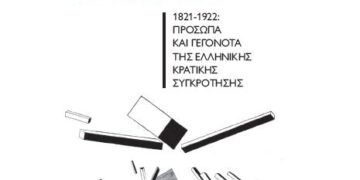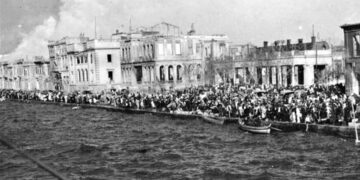Doğan Çetinkaya, Asc. Prof in Istanbul University, and a political activist
Turkey celebrates the end of Greco-Turkish War (1919–1922) as a huge victory, a cornerstone in Turkish War of Independence. In Greece the “catastrophe of Smyrna-Izmir” is another word for disaster. Can we reevaluate the facts from a different perspective and weigh them in relation to a future of equality and freedom?
1922 is a significant turning point in the history of Asia Minor, it contains many symbols that are intertwined in the history of both Greece and Turkey. The period between 1919-1923 is considered and called as the “National Struggle” and seen as a “victory” in Turkey. 1922 is the peak point in this turning point. The Ottoman Empire, which was defeated after the First World War, was occupied by the Western Powers who had defeated her. According to the nationalist discourse the motherland was saved from this occupation after a three-year struggle. After the military victory on 30 August 1922, the military conflict came to an end with the reconquest of İzmir on 9 September. Later, the Ankara Government, which carried out this military struggle, abolished the sultanate on November 1, 1922, and ended the dual power that had been going on since the opening of the parliament in Ankara in 1920, and became the only power. This is the way 1922 is remembered and this is its summary in Turkey. If we put aside the marginal attitudes, there is not a big difference in this regard between mainstream and leftist politics in Turkey. There is a similar memory and attitude towards the history of 1922.
On the Greek side, 1922 is the other name of the catastrophe. It is the break and separation of the Greeks from the lands they have lived for centuries. It is the removal of a “nation” from the east of its “civilization” and its “geography”. It is not just the military loss of Smyrna, which is remembered like a dream today. It is the perishing of a town by the fire. I It is the erasure of the past and its memory. Of course, it is not unique to Smyrna. The burning of the neighborhoods left behind and the destruction of their cemeteries are typical elements of this history from Thessaloniki to Istanbul. But the “anatoli” of the Greek world, that is, its east, became the “Anatolia” of the Asia Minor, the word used in Turkish today. That is to say, the word is completely Turkified, as is the land. 1922 was followed by 1923. But it is not a question of chronology. 1923 is mostly the proclamation of the Republic in Turkey. However, it is exchange of populations in Greece. Greece is full of toponyms with the “New” prefix. Those who came to Greece brought the names of their hometowns with them. But, on the contrary there is probably only one such place in Turkey. It is “Yenibosna”. Therefore, the exchange of populations is always remembered on the Greek side. In Turkey, it is necessary to be an academic to remember, or even to know.
Therefore, 1922 has two opposite memories on both sides of the Aegean. Of course, 1922 was the last point. Until then, especially after 1912, there have been deep pains between the two peoples committed especially by their political representatives: conflicts, boycotts, exiles, massacres, atrocities etc. There has been a very serious accumulation of these in the collective memories and the “otherization” of the other. However, the Turkish left is unable to establish a link between these ethnic cleansings and 1922. The most important reason why the Left in Turkey does not look at 1922 differently from the Right is that Greece is thought to have come to Anatolia as a “pawn of the imperialists”. Of course, it is a fact that England supported this invasion with its promise to Greece.
the Left is included in the national discourse with a “discourse of victory” against imperialism
On the Turkish side, 1919-1922 is a “War of Independence”. And this liberation in the nationalist discourse is a liberation from imperialism. Especially the British, French and Italian occupation strengthens this discourse. However, there were no serious military conflicts with these countries. In the last instance 1919-1923 is a Turkish-Greek War in practice. However, 1919-1922 is not remembered exclusively as a Turkish-Greek War in Turkish literature and memory. This memory enabled the conflict to be positioned as a struggle against imperialism and a war of independence. The native and authentic Greek people of Anatolia were also positioned as a collaborator of this occupation and coded as foreigners. Thanks to this point of view, political parties such as TİP (Worker’s Party of Turkey), Sol Parti (Left Party) and TKP (Communist Party of Turkey), which are among the major organizations of the Turkish socialists, also embrace the “victory day”, which is celebrated as the day of the Turkish Armed Forces, and celebrate this day as a national day. The destruction of communities and human population, massacres, etc. that took place in that process is forgotten. By forgetting these processes, the Left is included in the national discourse with a “discourse of victory” against imperialism. They broadcast congratulatory messages. Nor do they have an alternative perspective, a perspective from below.
The history, on the other hand, is not that polarized. During the Greek occupation, many segments of the Turkish/Muslim population were able to get on well with the Greek administration. This left a mark even in Turkish literature, in the canons of Turkish novels. One of the most striking instances in Yakup Kadri Karaosmanoğlu’s novel named Yaban (Wild) is the moment of trauma when the nationalist intellectual faced this reality. On the other hand, a nationalist Turkish newspaper Köylü (the Peasant) developed good relations with the Greek authorities during the years of occupation. In the Greek Army, on the other hand, a serious resistance emerged among the soldiers and there were even armed conflicts between the soldiers within the Greek Army itself. During the National Struggle, military conflicts took place within the Turkish side, a leadership struggle was fought, and social struggles played significant roles. Halid Edip (a very famous woman from the era), who also spoke at one of the most symbolic anti-occupation nationalist rallies, underlined that they are against the occupying governments, not the peoples. All these different elements, lines and gray areas beyond black and white are forgotten unfortunately.
The popular dynamic that emerged especially in the 1908 Revolution, the social struggles, the struggle of “our common ancestors”, who fought within the framework of “struggles for social and political rights” by staying out of the ongoing ethnic strife, is the basis on which the future we can build on. It is the ground we can put our feet on. Although the Greek Left is much better equipped in this regard, the Left in Turkey is not equipped enough to find or create an alternative way out of the nationalist narrative. This must be an issue also in our struggle for a future of “equality” and “freedom.”


















